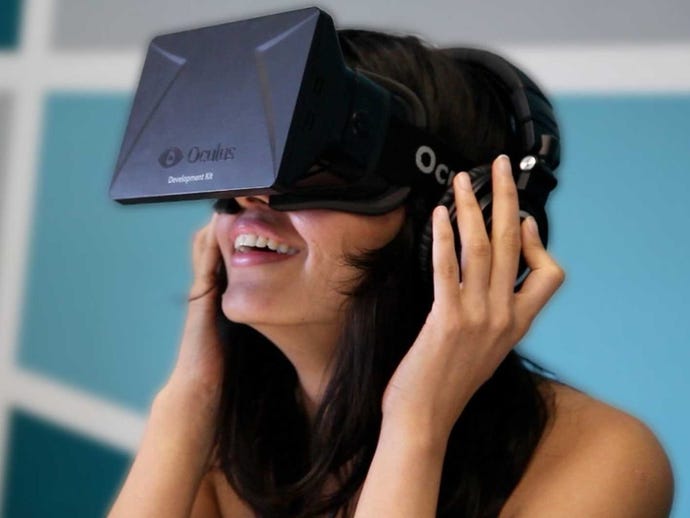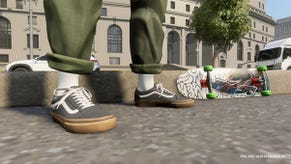Roundtable: Does virtual reality have a commercially viable future?
Oculus firmly believes that VR will be integral to the evolution of gaming, but it's clear that consumers still need some convincing. Dave Cook speaks with several VR developers to see if the tech has a viable commercial future.
"It’s all down to the immersion. Playing a game properly in VR is such a huge step beyond playing it on a 2D monitor or TV" - Patrick O'Luanaigh, nDreams
People have historically felt intimidated by things they don't understand. We often fail to grasp the value of new technology or services unless they offer something that will directly benefit us, and while that's perhaps a little self-centred, it isn't entirely incorrect.
Disruptive, unproven concepts - if they are commercially available at all - are often expensive, and until we as consumers are convinced our money is well-spent, they will always be viewed with an air of scepticism. You need a reason to invest good money in innovations like VR, and while it's clear Oculus and other companies feel the concept has a viable future in your home, we're yet to see the full potential of such technology as a consumer product.
Just how will this radical, wearable technology impact the gaming and where can it sit amid the home environment? When pricing VR technology in stores, how much is too much? And can issues surrounding motion sickness ever be fully eradicated?
These are all unanswered questions that Oculus, Valve and - if these rumours are to be believed - Sony are trying to answer. It's clear that the solutions will not simply present themselves any time soon, but the wheels are in motion as you read this. It's easy to laugh and draw comparisons to the Virtual Reality fad of the early '90s, but companies have learned from that saga, and are hell-bent on convincing the market that this, whether you want to believe it or not, is the future.
Is VR just a fad?
UK-based game developer nDreams has dabbled in a variety of VR devices for some time now, and has produced several internal prototypes. "I've had the good fortune to have used a number of different VR headsets (and to have visited Oculus in Irvine, which was mind-blowing), and I am totally convinced that VR is an area which will grow hugely over the next few years," says founder and creative director Patrick O'Luanaigh.
"It's all down to the immersion - great VR puts you into another world. It takes that feeling of immersion to a totally new level and allows players to forget completely about the real world. Playing a game properly in VR is such a huge step beyond playing it on a 2D monitor or TV.
"VR is very demanding hardware-wise. Virtual reality will force a step up of the hardware performances, pushing the market forward" - Flavio Parenti, Untold Games
"For me, the difference between a fad and a revolution is whether the new thing really is an improvement on the old thing. And I believe VR will be a revolution. It's not going to impact mobile gaming, because it's not something you'll do on the move for a few minutes at a time, but it will change how people game when they're sat down in their lounge, office or bedroom."
I first used an Oculus Rift device at a game jam in Dundee, Scotland. The game in question saw me moving a dog around an open world park, utilising an Xbox 360 control pad and headset display. I could make the canine run by bobbing my head up and down, tilt it slightly to urinate on passers-by and gaze around the colourful world by my own head movements alone. We take a pad's right stick for granted as it's almost always used for camera control. Once you pop on a VR headset that's no longer the case. It's both disorientating, overwhelming and exciting at first try.
"Once you experience cutting-edge VR, the kind of which Valve is prototyping at the moment, you know in your gut that it's too much an awesome experience to be dismissed as a fad," says Bossa Studios' founder Henrique Olifiers.
"The kind of emotions and feelings a developer can evoke in the player with this tech is beyond anything else out there, it's science fiction stuff. So we're clear - this is not what you can currently experience with the first generation of Oculus Rift. It's something else entirely.
"That said, I don't believe we will see it used everywhere any time soon," he adds. "I don't think VR is a type of tech like an iPhone that everyone will just 'get it' and embrace right away. It's new tech that will be niche to early adopters for some considerable time. Then, at some point, a developer will come up with the killer game for VR and it will be Wolfenstein and Doom all over again, with mainstream trying it out and falling in love with it. That would be my guess."
"Some say that Oculus Rift was planned at the beginning to be publicly sold for $300. It is in my opinion a fair price because it is affordable" - Christophe Longuepee, Streum On Studio
Like Olifiers, Italian actor and film-maker Flavio Parenti agrees that VR is no fad as well as being a demand on current hardware. His studio Untold Games is currently working on Loading Human, a first-person adventure game that sees players exploring convincing worlds using motion and head tracking.
He suggests that interest in VR from gamers is high, and if it's well managed by the industry then the technology could indeed prove profitable. It might not be within the means of console, game or hardware developers just yet, however.
"VR is very demanding hardware-wise," Parenti warns. "Rendering stereoscopic 3D requires approximately twice the raw power of today’s game. This means that virtual reality will force a step up of the hardware performances, pushing the market forward. Virtual Reality will start as a niche, but it will very soon become a new entertainment media standard for many thing other that video games."
It's clear that creators believe VR to be - if not instrumental - then additive to the game medium, but it's entirely understandable why scepticism comes from the players themselves. Oculus Rift is not a commercial product yet, and for those lucky enough to have tried the device or some equivalent at consumer expos or trade shows, one small demo isn't enough to give a fair view of the technology's long-tail prospects.
How much should VR set-ups cost?
"You can buy an Oculus dev kit for $300. It's already an astonishing piece of hardware that has become obsolete because of the arrival of Crystal Cove. The Crystal Cove is ready and has been tried by many. All them said that the biggest issue was solved: No more nausea." - Flavio Parenti, Untold Games
It's all well and good for VR developers to say that the technology will become the future, but what does that mean, and how do we get from those early projections to a reality where one we walk into any entertainment store, or visit our favourite website, and purchase a VR set-up?
Consider that we've seen Oculus Rift devices used with a variety of attached inputs, such as Razer Hydra sensing controllers, standard control pads, Kinect bars, other motion attachments and more. Suddenly, VR set-ups don't appear so straightforward, but it's key to stress that these are prototype devices unintended for commercial use. Could a manufacturer release an all-in-one VR and hardware kit at a single cost? Might these packs be sold as a new gaming format in their own right?
"Some rumours say that Oculus Rift was planned at the beginning to be publicly sold for $300. It is in my opinion a fair price because it is affordable, more or less depending on your means, but it remains reachable," suggests Christophe Longuepee of Space Hulk: Deathwing developer Streum On Studio. "Without taking into consideration any construction price, I think it should not be more than a fair priced LCD monitor."
"I'd like to see commercial VR headsets coming in at £150-£200," offers O'Luanaigh. "And don't forget that the first headsets to launch will just be the beginning - just like mobile phones have evolved greatly from the first versions that were launched in the 1980's, you'll see headsets evolve, becoming smaller, lighter and cheaper.
"Imagine a £50 wireless VR headset the size and weight of a pair of Ray-bans, or even VR contact lenses. This technology is only going to get better and better."
"Once you eliminate display lag, pixel ghosting, axial delay; add translation motion tracking and avoid unnatural movements, you virtually get rid of motion sickness altogether. The prototype I’ve tried at Valve is like that" - Henrique Olifiers, Bossa Studios
It is true that the price of technology decreases as the cost of production lowers, and this, again, relates to the way we perceive the relevancy of certain products. 'Can I afford this piece of technology?' 'How does the investment improve my life or make it more convenient?' Until consumers see a valid reason to own a VR device it's unlikely that naysayers will come round to the concept, especially as a first-gen Oculus Rift will set you back $300. That's not too far from a new PS4.
"Right now the king of VR is the Oculus Rift," Parenti says. "There are others project that started on Kickstarter, but they have yet to come out with a real product. You can buy an Oculus dev kit for $300. It is an already astonishing piece of hardware that has become obsolete because of the arrival of Crystal Cove.
"The Crystal Cove is ready, but not for sale yet, and has been tried by many. All them said that the biggest issue was solved: no more nausea. We expect the first mass marketed Oculus to come out around Q4 2014 / Q1 2015 but of course, it’s all up to Oculus."
Parenti's mention of nausea is important, chiefly because health risks do not make for good marketing. This was a problem expressed by the few that used Nintendo's Virtual Boy viewer when it launched in 1995, and those who experienced Virtual Reality arcade machines. Eye strain, headaches and other cranial issues sent alarm bells ringing amid the press at the time, and it led the concept to a quick death. These are changed days however, and if this developer is to be believed, Valve has already solved the issue using QR-based positional tracking.
Wallpapering one's home with QR codes is hardly practical nor desirable however, so a more logistical solution needs to happen. As Parenti suggests, Crystal Cove seems to have remedied the issue. From my own experience, I can play a game using an Oculus Rift device for all of 20 minutes before I start sweating and my eyes start to feel strained. Does this put me off VR? For now, yes, but I'm not blind to the technology's potential.
Combating motion sickness
"We need to start developing dos and don’ts in game design. Things mapped as able to make players uncomfortable have got to be avoided. Then, the interesting part begins: picking all the things only VR can convey and build experiences around that" - Henrique Olifiers, Bossa Studios
"No one is quite sure why motion sickness takes place," Olifiers explains. "But there are some good theories out there. I follow the school advocating it's an evolutionary trait to defend against poisoning: if you eat something you shouldn't have, it makes your vision lagged, blurred, you feel dizzy. Then in turn your body react to these signals by making you sick to get rid of whatever you ate.
"Once you eliminate display lag, pixel ghosting, axial delay; add translation motion tracking and avoid unnatural movements - like running backwards or strafing, hallmarks of FPS movement - you virtually get rid of motion sickness altogether. The prototype I've tried at Valve is like that. Whoever matches [Valve's] recommended specs will have a VR headset that won't make you uncomfortable as long as the games running don't do anything silly in VR terms."
While Valve seems to have the issue solved to a point, O'Luanaigh stresses that Oculus has made major strides in combating motion sickness for a vast majority of players. "Games need to be designed not to do stupid things with the camera and need to run at a high refresh rate," he says. "The hardware needs to have high refresh rates or low persistence screens [and] the hardware needs to have positional tracking as well as rotational tracking.
"Fortunately I think that, hardware-wise, all these points will be met by the launch VR headsets. Software-wise, it's down to game developers - if you want to make someone feel ill, it's easy to do. But if you don't, it's pretty easy to avoid as well."
I'm someone who feels sick using the 3D functionality on my 3DS, so I'm still wary of VR motion sickness being eradicated completely, but that's what these long prototyping stages are all about; solving problems. This is why companies like Oculus and Valve are hiring new, talent individuals to help bring the tech to a level that is universally acceptable and most importantly; functional. Perhaps VR can't afford another false-start, but that's why significant time is being put into the R&D phase.
What's interesting, however, is that VR is commonly discussed as a method of controlling games, first and foremost. The tech has far-reaching applications that are only just rising to the surface, such as simulations of life-threatening bomb disposal scenarios or complex surgeries. Research conducted in the games industry can also apply to other fields, and this pooling of knowledge should prove invaluable in bringing VR into the home or work environment in meaningful new ways.
What's next for VR?
What are the next steps for virtual reality in games?
"There is one direction: you are in the game," says Parenti. "You’re not watching it any more, you’re not remote controlling it any more, you are inside of it and cut off from reality. This requires a complete change of mindset, and that’s what we’re aiming with Loading Human’s game design."
"Game creators are tinkerers and inventors who tend to deconstruct, recreate and optimise several facets of the development process. Coders such as John Carmack – who now works at Oculus – are known for their tenacity when approaching code-based problems, and are praised for being intelligent problem-solvers."
Olifiers offers a more practical response focused on the idea of collective learning. There are many developers dabbling in VR prototypes today, but are there any ironclad rules of thumb, or readily-accessible data-banks or guides for those looking to improve their projects? "We need to start developing a VR Tome with dos and don'ts in game design terms. Things mapped as able to make players uncomfortable have got to be avoided at all costs .
"Then, the interesting part begins: picking all the things only VR can convey and build games and experiences around that. Scale, vertigo, immersion, all perceptions that no game has used before quite like VR can empower. This is why I've used the analogy to Wolfenstein 3D, which brought to the table something new that, and all of a sudden opened up a world of game design possibilities. VR brings more than that from a technical perspective."
"I'm excited by games that are designed with VR in mind from the beginning," offers O'Luanaigh. "At nDreams, we have spent the last eight months playing around with VR, creating prototype after prototype, experiment after experiment. We've tried a huge range of different things to see how they work in VR.
"Some really didn't work and some were amazing. We're now working on a number of games and experiences, and I'm really proud of what the team are creating. In fact, we're so excited about VR that we took the unusual step of funding an independent VR gaming website called VRFocus, which is purely about VR games. We want to help spread the word about VR, and be part of the most exciting year that VR has ever seen."
There's genuine excitement surrounding VR in the game development community. Game creators are generally tinkerers and inventors who tend to deconstruct, recreate and optimise several facets of the development process and their projects. Coders such as John Carmack - who now works at Oculus - are known for their tenacity when approaching code-based problems, and are generally praised for being intelligent problem-solvers.
The commercial viability of VR headsets and wearable computing are perhaps two of the most difficult and potentially evolutionary problems facing game developers today. Those who are involved in that world are scratching their heads over how to bring these devices to market in a way that works, and while it may take years for companies to fully realise that prospect, the signs are all around you that given time, the way we participate in the hobby is on the cusp of something potentially radical.
















